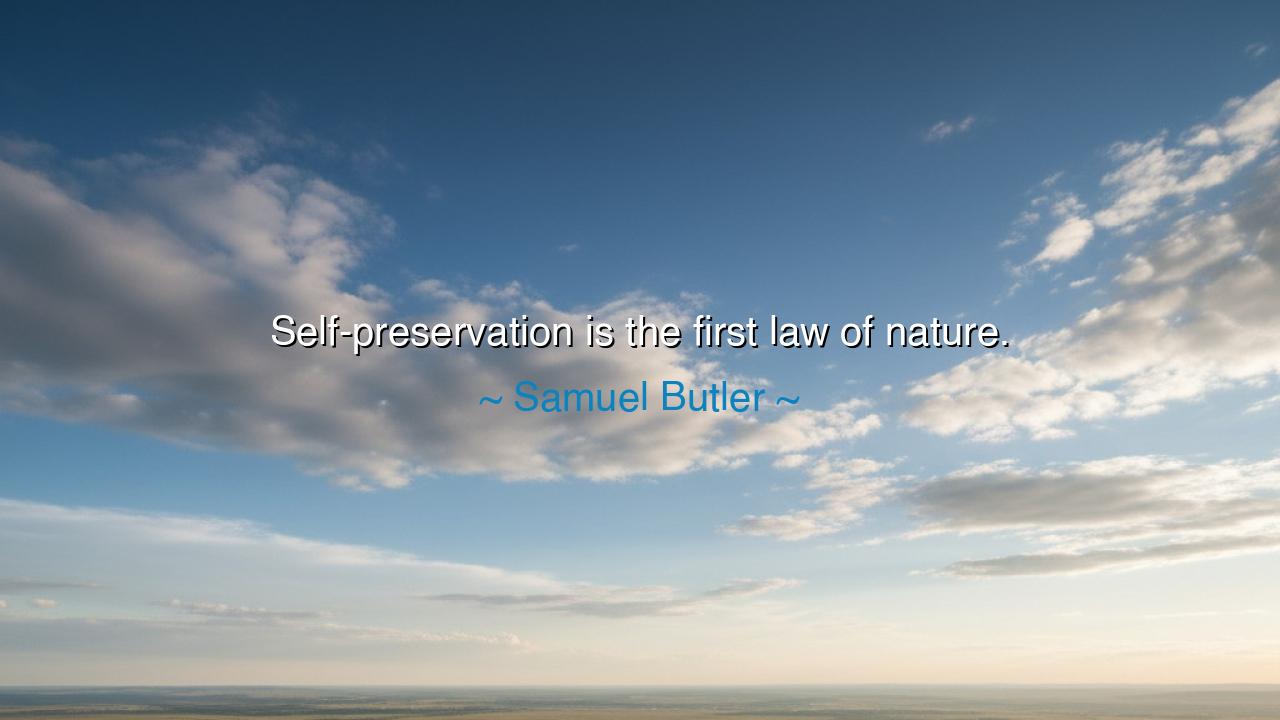
Self-preservation is the first law of nature.






Samuel Butler, with the brevity of a sage, once declared: “Self-preservation is the first law of nature.” In these few words, he reveals the primal force that beats within every living creature: the instinct to endure, to guard life against harm, to fight against the void that seeks to consume it. This law is written not on tablets of stone, but into the very blood and sinew of all creation. Before reason, before philosophy, before civilization, there is this: the will to survive.
The origin of this truth lies in the earliest struggles of life itself. The fish that swims against the current to spawn, the bird that shields its fledglings from the storm, the soldier who raises his shield in battle—all are obeying this eternal decree. Butler, a thinker of paradox and wit, did not invent this law but only gave it clear voice: survival is not only instinct but duty, for without it, no other law, no art, no virtue can endure. Life must first be preserved before it can flourish.
History abounds with examples of this law at work. When Hannibal crossed the Alps, his men starved, frozen, and harried by enemies, yet they pressed on, driven by the raw will to survive and conquer. When the people of London endured the Blitz, they descended nightly into shelters, not out of cowardice but out of the fierce law of self-preservation, which allowed them to rise again each morning and defy the darkness. From the humblest peasant clinging to the land to the greatest leader guarding a nation, this law is the bedrock of endurance.
Yet Butler’s words are not only about physical survival. There is also the preservation of the spirit, the safeguarding of dignity, of integrity, of truth. For what does it profit a person to keep breath in their lungs if their soul has been extinguished? Thus, self-preservation is not merely the clinging to life at all costs, but the protection of what makes life worth living. True self-preservation guards both body and soul, shielding not only against death but against corruption and despair.
There is, however, a paradox. For while self-preservation is the first law, it is not the highest law. Those who cling too fiercely to their own safety may betray honor, justice, and love. History remembers those who risked self-preservation for a higher cause: Socrates, who drank the hemlock rather than betray his philosophy; martyrs, who faced death rather than renounce faith; heroes who stepped into danger to save others. Thus, the first law of nature must be balanced by the higher law of virtue, lest survival itself become an idol.
The lesson for us is clear: respect the law of self-preservation, but do not worship it. Guard your health, your safety, your strength, for they are the foundation upon which all higher endeavors rest. But when the hour comes that demands sacrifice, do not be enslaved by this law. Be prepared to preserve not only your body but your spirit, your truth, and your love. Only then is self-preservation truly fulfilled.
Practically, this calls us to cultivate wisdom and balance. Care for your body with food, rest, and discipline. Guard your mind against despair and corruption. Build resilience in times of peace, so that when times of trial come, you have strength to endure. But also prepare your heart to know when to let go of fear and place higher laws above your own survival. For it is in that tension—between the will to endure and the call to sacrifice—that the greatness of humanity is revealed.
Thus Samuel Butler’s words ring across the ages: “Self-preservation is the first law of nature.” It is the law that births all others, the spark from which endurance rises. Yet it is not the only law, nor the last. Remember it, honor it, but master it—so that you may not only survive, but live nobly, passing down not just life, but the wisdom of life, to those who come after you.






AAdministratorAdministrator
Welcome, honored guests. Please leave a comment, we will respond soon